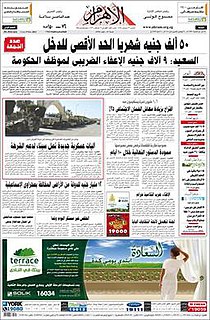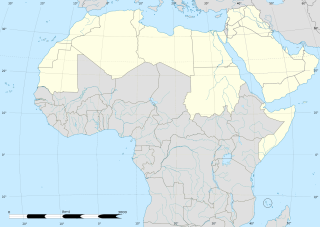This article needs to be updated.(May 2016) |
| This article is part of a series on |
| Life in Egypt |
|---|
 |
| Culture |
| Society |
| Politics |
| Economy |
Egypt portal |
The media of Egypt is highly influential in Egypt and in the Arab World, attributed to its large audience and its historically TV and film industry supplies to the Arab-speaking world. [1] A period of ease on media marked the last years of Hosni Mubaraks rule, but since the 2011 revolution and 2013 coup d'état, Reporters Without Borders said "successive governments have tried to control the media and have not hesitated to impose measures restricting journalists' freedom," in 2016, and "the situation of media freedom in Egypt is extremely worrying" in 2017. and while state media is "almost always loyal to President al-Sisi." and most pro-Islamist media have been closed, or now broadcast from abroad, [1] journalists and human rights defenders are denied access to parts of Sinai region, and are obliged to report only the official version of "terrorist" attacks under the terrorism law that was adopted in August 2015. [2] Following the 2011 revolution, acquisitions of media outlets and private newspapers by businessmen linked to the government started surfacing, initially with close ties to the newly in-power Muslim Brotherhood, businessmen then shifted in 2013 with the deposition of former President Mohamed Morsi to Gen. Abdel Fattah al-Sisi's support and regime. In 2016 the take over by businessmen linked to the government and intelligence services escalated rapidly; [3] and the regime's domination of the media is affecting even pro-government media. In addition to those acquisitions, the government tapped into the market with a major new TV network named "DMC" with a range of news, sports and entertainment channels changing the landscape beyond the "official" outlets that lost their credibility, [4] DMC also imposed a de facto monopoly over filming where other privately owned TV channels are denied access. [5] On the internet, Egypt banned at least 62 websites in a crackdown in June 2017, including Daily Sabah, Medium, Al Jazeera, The Huffington Post, and Mada Masr along with opposition websites, like El-Badil, for containing material that "support terrorism and extremism as well as publish lies", that blockade was followed by a growing list of censorship circumvention and VPN providing websites in addition to the blockade of OpenVPN protocol on a nationscale. The crackdown was condemned by the Association for Freedom of Thought and Expression (AFTE), Mada Masr and by the Index on Censorship. The ATFE stated that "the blocking of websites violates the Egyptian Constitution". [6] [7] The country saw a period of increasing freedom from governmental control during last years of ousted president Hosni Mubarak. [8] [9] Although Freedom of the media is guaranteed in the constitution, and the government was increasingly respecting this, however many laws still remain that restrict this right. [8] [10] Back in 2005, and after the Egyptian presidential election, Ahmed Selim, office director for Information Minister Anas al-Fiqi, declared the era of "free, transparent and independent Egyptian media". [9]






